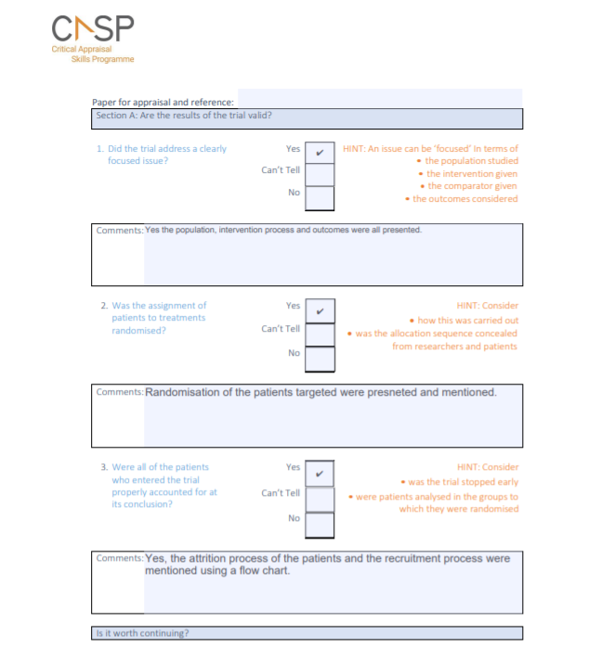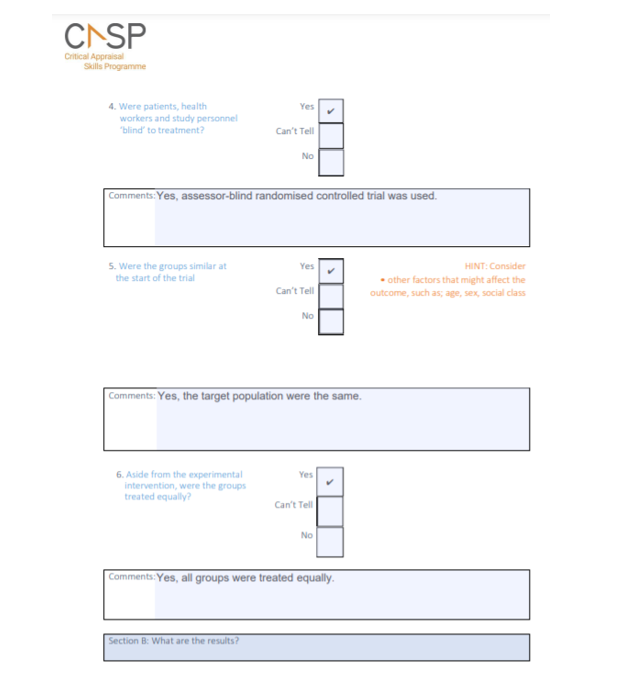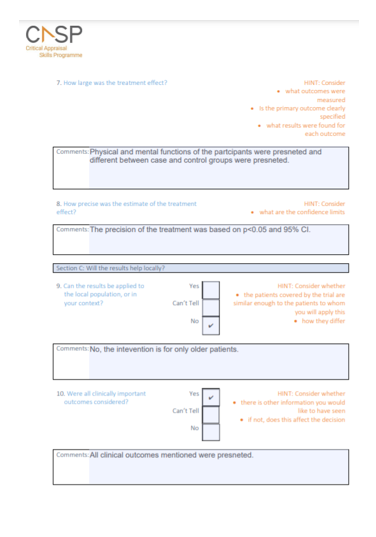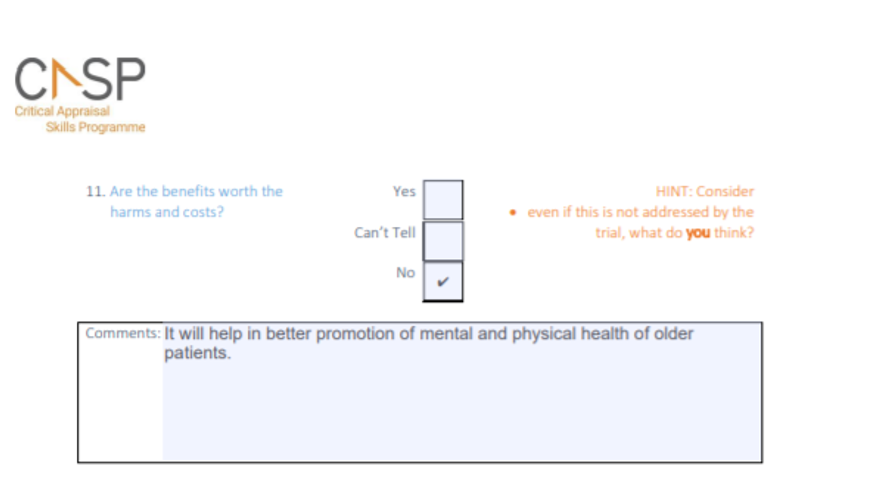PUB015-6 Assignment Sample – Public Health Intelligence 2022
Introduction ( PUB015-6 Assignment Sample – Public Health Intelligence 2022 )
The main aim of this report is to critically appraise a primary study by application of the CASP critical appraisal tool. The primary paper that has been used for the current assignment is authored by Chen et al. (2021) and the title of the paper was “Otago exercise programme for physical function and mental health among older adults with cognitive frailty during COVID‐19: A randomised controlled trial.”
Since the current paper is an RCT based design, the CASP checklist for randomised controlled trials (RCT) was used in this study to appraise the paper (casp-uk.net, N.D.). The checklist has been effectively used whereby every aspect of the checklist have been investigated and then a critical appraisal of the chosen primary paper has been presented.
The checklist explores different areas of the research paper from the clarity of the research purpose to methodologies used as well as presentation and clarity of the data findings (casp-uk.net, N.D.). The report has four main segments, the validity of the paper, the method used in the paper, results presented in the paper, and lastly conclusion of the paper along with an introduction and conclusion to the critique.
Validity
The chosen paper has a clear focused research question and an aim for the research study. The aim has been presented as “to assess the effect of 12 weeks group OEP among older adults with cognitive frailty that was living in nursing homes during the COVID-19 pandemic in China” (Chen et al. 2021, p.3). Along with the aim of the study, the hypothesis of the study was also clearly presented that will be explored in the study.
However, no research question or primary question and secondary questions of the research but the aim and the purpose of the study were presented. The research design that was used in the study was a “parallel-group, assessor-blind randomised controlled trial” and a randomised controlled trial method of experimental research is the best way to conduct an interventional assessment (West et al. 2008).
Since the aim was to explore the efficacy of using the Otago exercise programme (OEP) on older populations with cognitive frailty, by using the RCT method a significant difference in physical and mental function between the control and intervention groups was explored. Therefore, the application of RCT is in line with the aim and the hypothesis developed for the study.
Methods
Participant recruitment is one of the most important tasks in experimental research studies as it involves the setting of limitations for recruitment and recruiting only that population that fits the study (Gupta et al. 2015). The recruitment process used in the current study was clearly explained and the participant recruitment was based on inclusion and exclusion criteria.
Furthermore, the study being an RCT, the target population were randomised into two groups with 31 participants in each group. However, the study fails to mention the detailed method of recruitment like a collection of informed consent and attrition of the participants.
Data collection in any experimental and primary study is the primary process because without data there is nothing to assess and address the aim of the research (Ghasemi et al. 2019). However, data collection or the data sources must be relevant and reliable for the study to be not biased.
The data collection process in the study by Chen et al. (2021) included a collection of patient information like demographic and clinical information of the target and included patients. In addition, the impact of the OEP programme data was also collected for different factors like physical function, cognitive function and depression through interviews for 6 and 12 weeks.
No confounding factor was used or developed in the study that affected any of the independent and the dependent variables in the study (Goldsmith et al. 2018). In many experimental studies, some factors are introduced to show the impact on dependent and independent factors and using confounding factors helps to maintain the validity and reliability of the study (Ghasemi et al. 2019).
However, the reliability and validity of the study were based on the double entry of the data and inspection of the data integrity was checked by third parties of the researcher study.
Ethical considerations are very important to ensure that the study was not deceptive and the participants of the study have knowledge and awareness of why they were recruited along with their rights (Das, 2011). The ethical approval of the current paper was provided by the Ethics Committee of Xiangya Nursing School of Central South University and this shows that the study had followed all aspects of ethical considerations because humans were included in the study.
To further validate the ethical aspects of the study, the study has been stored at the Chinese Clinical Trial Registry and Chen et al. (2021) considers aspects like the right to withdraw, confidentiality and voluntary participation.
Results
The case paper being an RCT and numerical data was collected to address the research aim; the research section has used a mix of tables and graphs to present the findings from the statistical assessments. Descriptive assessments of the patient information like demographics and clinical information like comorbidities, if the patient was using a walking aid, and Montreal Cognitive Assessment amongst others were all presented.
The descriptive findings were presented in percentages and standard deviations followed by the p-value significance of the findings (Lee, In, and Lee, 2015). Furthermore, descriptive findings of the control and intention groups were also presented from outcomes of the OEP programme followed by t-test findings where a significant difference between the two groups was presented.
As for the confidence intervals, 95% CI was considered whereby the p-value less than 0.05 indicated that there was a significant difference between the two groups in the case t-test and no difference in case the p-value was more than 0.05 (Kim, 2015). The t-test was conducted for both the case and control groups for baseline, 6-week data and 12-week data for scores of outcome variables.
The p<0.05 concept was used to help in addressing the hypothesis of the study and since the p-value was less than 0.05 the null hypotheses were rejected and the alternative hypotheses were accepted indicating a significant difference between the two groups. The results are valid because Chen et al. (2021) mention that similar results have been also indicated in the case of previous interventional programmes.
For instance, in the discussion section, Chen et al. (2021) indicated that “our results support a recent study that reported physical exercise was an effective therapy for both mental and physical health among elderly people during the COVID-19 pandemic” (p.8). In addition, the aim of the study and the hypotheses have also been addressed in the discussion, therefore, the findings of the study are reliable and replicable.
Applicability
The study was based on assessing the efficacy of using the Otago exercise programme (OEP) on older populations with cognitive frailty, and therefore, the intervention plan is limited to only community-dwelling older adults or older patients under special care and not home care.
Therefore, this cannot be used for the local population other than the old population under the supervised care of specialised nurses. For a local population that is not old or under self-care, different programmes or interventions must be planned. As mentioned in the previous section, the current study is in association with the similar type of research conducted by Jiménez-Pavón, Carbonell-Baeza, and Lavie, (2020) and this is why it can be stated that the current study is relatable to past research papers.
In addition, the application of the OEP programme is also based on past multicomponent exercise-based programmes conducted for older people and showed better results for the patients in terms of physical and mental function development. Therefore, the current study findings and the methods used are a fit for replication in the future as the study is reliable and valid.
It is expected that the findings from the application of the Otago exercise programme (OEP) on the older population with cognitive frailty can help to improve physical and mental functions. Government and healthcare providers in China as well as in other regions of Asia can also implement and adopt the OEP programme for improving the physical and mental function of the older population under specialised care by nurses in a similar situation of the pandemic in the future.
This will not only reduce the mental and health care burden on the Government but also improve the livelihood of the older population.
Conclusion
In this critique, the paper by Chen et al. (2021) titled “Otago exercise programme for physical function and mental health among older adults with cognitive frailty during COVID‐19: A randomised controlled trial” was used. The aim was to explore the efficacy of using the Otago exercise programme (OEP) on the older population with cognitive frailty.
To critique the paper, a CASP quality checklist was used for RCTs and every aspect of the paper were assessed to address the need for the critique.
References
casp-uk.net, N.D. CASP CHECKLISTS. Retrieved 19 Oct 2021, from https://casp-uk.net/casp-tools-checklists/.
Chen, X., Zhao, L., Liu, Y., Zhou, Z., Zhang, H., Wei, D., Chen, J., Li, Y., Ou, J., Huang, J. and Yang, X., 2021. Otago exercise programme for physical function and mental health among older adults with cognitive frailty during COVID‐19: A randomised controlled trial. Journal of Clinical Nursing.
Das, A.K., 2011. Randomised clinical trials in surgery: a look at the ethical and practical issues. Indian Journal of Surgery, 73(4), pp.245-250.
Ghasemi, A., Bahadoran, Z., Zadeh-Vakili, A., Montazeri, S.A. and Hosseinpanah, F., 2019. The Principles of Biomedical Scientific Writing: Materials and Methods. International Journal of Endocrinology and Metabolism, 17(1), pp.e88155-e88155.
Goldsmith, K.A., Chalder, T., White, P.D., Sharpe, M. and Pickles, A., 2018. Measurement error, time lag, unmeasured confounding: Considerations for longitudinal estimation of the effect of a mediator in randomised clinical trials. Statistical methods in medical research, 27(6), pp.1615-1633.
Gupta, A., Calfas, K.J., Marshall, S.J., Robinson, T.N., Rock, C.L., Huang, J.S., Epstein-Corbin, M., Servetas, C., Donohue, M.C., Norman, G.J. and Raab, F., 2015. Clinical trial management of participant recruitment, enrollment, engagement, and retention in the SMART study using a Marketing and Information Technology (MARKIT) model. Contemporary clinical trials, 42, pp.185-195.
Jiménez-Pavón, D., Carbonell-Baeza, A. and Lavie, C.J., 2020. Physical exercise as therapy to fight against the mental and physical consequences of COVID-19 quarantine: Special focus in older people. Progress in cardiovascular diseases, 63(3), p.386.
Kim, T.K., 2015. T test as a parametric statistic. Korean journal of anesthesiology, 68(6), p.540.
Lee, D.K., In, J. and Lee, S., 2015. Standard deviation and standard error of the mean. Korean journal of anesthesiology, 68(3), p.220.
West, S.G., Duan, N., Pequegnat, W., Gaist, P., Des Jarlais, D.C., Holtgrave, D., Szapocznik, J., Fishbein, M., Rapkin, B., Clatts, M. and Mullen, P.D., 2008. Alternatives to the randomized controlled trial. American journal of public health, 98(8), pp.1359-1366.
Appendix-I (CASP RCT)




Know more about UniqueSubmission’s other writing services:

